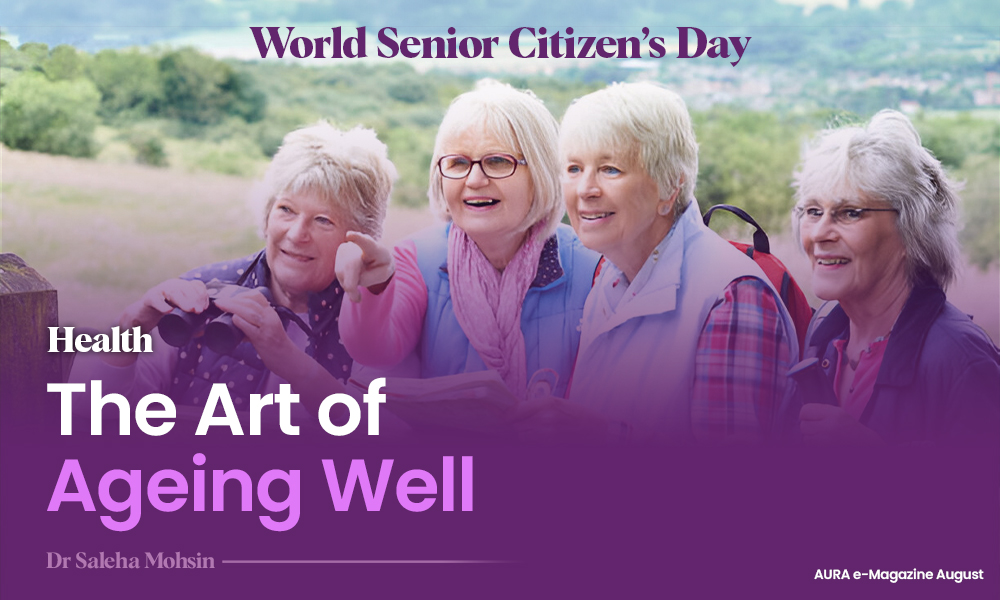Ageing is an inevitable part of life. In 2030, one in six people globally will be old (WHO). Old age is associated with several physiological and psychosocial changes. There are unavoidable changes at the cellular level that affect physical and cognitive health. Social isolation, retirement, and similar changes in life cause psychological impacts. Changes in physiological functions affect nutrient absorption, retention, and utilisation. Further, conditions like arthritis, dementia, impaired vision, and tooth loss can add to the discomfort.
Healthy ageing aims to develop and maintain functional abilities that support well-being as we age. Older adults require adequate healthcare and emotional support through an age-friendly social and physical environment. Along with developing individual physical and mental capabilities, providing a supportive and healthy environment for older adults is necessary for healthy ageing. Several actions can be taken to address these requirements and maintain the quality of life for older adults, empowering them to be independent and productive.
Taking care of physical health
While research has enlightened us with methods to slow the ageing process, there are multiple ways to maintain optimum health later in life. Physical health involves good nutrition, physical activity, actively addressing health issues, and getting enough sleep.
Nutrition: The nutrient requirement in old age depends on physiological changes and reduced food utilisation by the body. As age increases, the appetite decreases due to reduced metabolism and low physical activity. The demand for calories drops while the requirement for micronutrients increases. Older people need a diet rich in vitamins and minerals and adequate physical activity to remain healthy and active. Therefore, a healthy diet emphasising green leafy vegetables, whole grains products, low-fat dairy products, lean proteins like fish, legumes, fruits and healthy fats is important.
- Food must be nutrient-dense, rich in vitamins and minerals, complex carbohydrates, good-quality proteins, and adequate dietary fibre.
- Water intake must be adequate (2l/day) to prevent dehydration and constipation, common problems among older people.
- To prevent the potential risks of diseases, ultra-processed and HFSS (high-fat sugar salt) foods must be avoided.
- A daily diet must include at least 200-400ml of low-fat milk or milk products, a fistful of nuts and oilseeds, and 400-500g of vegetables (including green leafy vegetables) and fruits.
- Food must be well cooked and soft with less salt and spices.
Table 1: Nutrient Requirement in Old Age (ICMR 2024)
| Nutrient | Energy (kcal) | Protein (gm) | Calcium (mg) | Iron (mg) | Dietary fibre (gm) | Vitamin D (IU) |
|---|---|---|---|---|---|---|
| Man | 1700 | 54 | 1200 | 19 | 30 | 800 |
| Woman | 1500 | 46 | 1200 | 19 | 25 | 800 |
Table 2: Suggested Balanced Diet for the Elderly
| Composition of food group | Amount (grams per day) | ||
|---|---|---|---|
| Elderly man weighing 65 kg | Elderly woman weighing 55 kg | ||
| Cereals and millets | 180 | 140 | |
| Pulses, non-vegetarian food | 80 | 70 | |
| Green leafy vegetables | 100 | 100 | |
| Other vegetables | 200 | 200 | |
| Roots and tubers | 100 | 100 | |
| Fruits | 150 | 150 | |
| Milk | 400 | 400 | |
| Fats and Oils | 20 | 15 | |
| Oilseeds and Nuts | 30 | 30 | |
| Spices | 10 | 10 | |
Physical activity: Regular physical activity is the cornerstone to living in old age, free from pain and disability. Exercise helps to maintain muscle mass and bone density and improves brain function in the elderly. It helps to prevent the progression of degenerative diseases like Parkinson’s and Alzheimer’s. Moderate-intensity indoor and outdoor physical activity is advisable. Avoid vigorous exercises like heavy weightlifting and Zumba, as they may increase joint stress. WHO recommends 150 to 300 minutes of medium-intensity exercise (brisk walking, slow biking, tennis, gardening) or 75 to 150 minutes of vigorous-intensity exercise (jogging, running, swimming, rope climbing) per week in old age.
Good sleep: A good 8-9 hours of sleep is a must and is associated with decreased risk of dementia, improved insulin levels, better cognition, and improved quality of life. Studies have shown that poor sleep can worsen the symptoms of depression in the elderly. Sickness, pain, and the effects of medications make it difficult to get enough sleep. Following a proper sleep routine, avoiding nap times, engaging in physical activities, meditation, and socialising can improve sleep quality.
Regular health visits: Going to the doctor for regular checkups is important to address any impending medical condition. The body has undergone many harmful changes by the time disease symptoms appear. So, it is better to get regular health checkups to get timely treatment. Timely diagnosis and treatment improve the outcome of diseases. Regular screening can also help diagnose and correct nutritional deficiencies. It is advisable to visit the doctor yearly for health screening tests.
Taking care of mental health: Mental health is a serious concern in old age. Estimates show that approximately 14% of aged people suffer from mental disorders (WHO). Situations like loss of family and friends, retirement, loss of sense of purpose, abuse from caregivers, lack of support and care, and poor physical health can result in psychological distress. Loneliness, depression, stress, and isolation are common problems faced by the elderly, which can be managed through self-care emotional and medical support. Studies have shown that social isolation in old age increases the risk of depression and diseases of the heart and lungs. Some small efforts can help fight these problems efficiently.
- Staying connected with family, friends, neighbours, and colleagues in person and through the phone.
- Meeting new people through learning classes.
- Staying physically active.
- Reducing the time spent alone. Replacing it with exercise or outdoor activities like brisk walks, cycling, gardening.
- Participating in things of interest. Travelling, writing, reading, chatting, playing games, eating out, cooking, visiting friends and relatives.
- Being spiritually connected. It will keep them content and positive towards life and help them avoid stress.
- Participating in community activities. Joining religious gatherings, volunteering, donation campaigns, teaching skills, etc.
- Seeking medical help if any signs of depression like lack of sleep, loss of appetite, sadness, or loneliness are noted.
In conclusion, ageing gracefully is never out of reach. Managing a healthy lifestyle through good nutrition, physical activity, self-care, sleep, and engagement is the key to enjoying quality of life while ageing. Remember, it’s never too late to incorporate these changes. Age well by supporting your mind, body, and soul through intelligent choices.



0 Comments